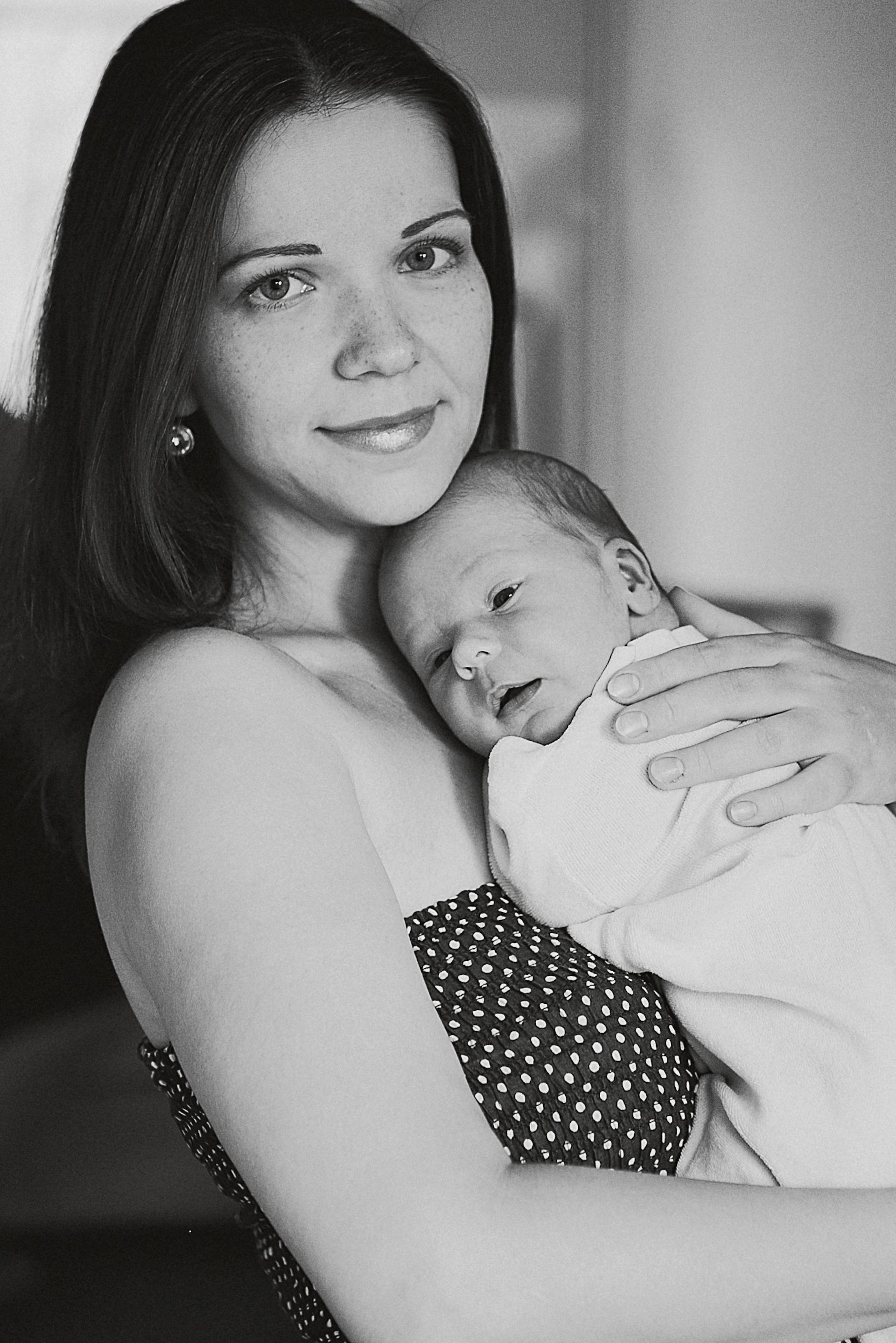
After 19 grueling hours of labor, I expected support—what I got was a $9,000 hospital bill and a husband who coldly told me, “Your bill, your problem.” Shocked and hurt, I silently planned a response that would make him rethink everything he thought about marriage, money, and fatherhood.
When I became a mother to my beautiful little girl, I never thought that soon after I would be on the verge of divorcing my husband.

A woman holding a baby | Source: Pexels
Lila came into the world on a thunderous Wednesday night, after 19 grueling hours of labor.
You know that kind of tiredness where your soul feels squeezed like a dishrag? That was me, holding this perfect little human who had made her way to earth as lightning streaked across the sky outside the hospital window.

Lightning over a city | Source: Pexels
Two weeks later, I was sitting at the kitchen table, wearing yesterday’s nursing tank top and yoga pants, when the mail arrived.
Bills, brochures, the usual. Then I saw an envelope thick enough to choke a horse, with my name printed in that cold, official font that screams “Medical Billing Department.”
My hands shook as I opened it.

A manila envelope | Source: Pexels
$9,347. That’s what it cost to bring our daughter into the world.
I walked into the living room holding that bill like a grenade, hoping my husband would deal with it with me.
You know how it is when you’re married, right? Big, scary things become smaller when two people stare at them.

A worried woman | Source: Pexels
“John,” I said. “The hospital bill came today, and it’s… well, we might have to draw lots to see who’s going to sell a kidney to pay for this.”
I handed him the bill. He didn’t take it, just looked up from his phone screen to skim the details.
For a moment I was reassured by his indifference, but then he said something so selfish it stunned me.

A man looking at someone | Source: Pexels
“Your bill, your problem,” he said, returning to his phone. “It was given to you, and it has your name on it.”
Wait. What?
At first, I chuckled. It had to be a joke, right? It was John, the man who’d held my hand during the contractions, who’d cried when Lila let out her first cry.

A woman looking at someone with a confused smile | Source: Pexels
The same John who had whispered, “We did it,” when the doctor placed our daughter on my chest.
But he was very serious. His thumb kept scrolling over what was on his screen. “I didn’t go to the hospital. You did. So the bill’s on you.”
“For giving birth to OUR daughter, John! I’m not even getting a massage.”

A woman gasping in shock | Source: Pexels
John let out a long sigh, put his phone on the table and looked at me.
“So? I’ll buy the diapers, the formula, and the wipes. I bought the crib, the stroller, her car seat, her clothes, all the other baby stuff… I’m not paying for that too,” she nodded at the bill.
That’s when something broke deep inside me.

An unbelieving woman | Source: Pexels
Not out of anger, but out of understanding. Like when you’re looking at one of those optical illusions and suddenly the hidden image leaps out at you and you can’t stop seeing it.
John has always been very detail-oriented.
He folds his own shirts and jeans because I “just can’t do it right,” and God forbid anyone but him cooks carne asada or enchiladas because John’s recipe is the only one that counts.

Enchiladas on a plate | Source: Pexels
This was more of that pedantic nonsense; she was sure of it.
So I tried to reason with him.
I really did.

A thoughtful woman | Source: Pexels
I pointed out all of our shared expenses in our shared home.
I reminded him again that Lila was our daughter, not a miracle baby of parthenogenesis.
I explained to him everything that made us “us” instead of just two people living under the same roof.

A woman staring at someone | Source: Pexels
“We split the mortgage,” I said, still holding that damn bill. “We split the food. We split the car payments. But somehow, the cost of bringing your daughter into the world is all mine?”
“I paid for everything else, and I’m still paying!” she snapped. “God, be an adult and pay YOUR bill.”
And maybe that was the real crux of the matter after all: money.

Two people arguing | Source: Pexels
John earns a little more than me, but we still split the bills 50/50. We were always doing well until I took (unpaid) maternity leave.
Suddenly, every dollar he spent was an occasion I had to be grateful for.
All those things she was showing off as proof of how much she’d spent on Lila—the crib, the diapers, etc.? They cost her about $3,500, while I had to listen to endless complaints about how expensive the baby’s stuff is.

A man with a credit card in his hand stares at his phone in astonishment | Source: Pexels
But you want to know what really got to me? It wasn’t the money, but how quickly I had reduced the most transformative experience of my life to a transaction.
As if I had gone to the hospital for elective surgery.
I stared at that bill that was technically only mine, legally only mine.

A woman looking at a bill | Source: Pexels
Fine . If John was going to be a jerk, I would be too.
The next day, I opened a payment plan and started making those monthly payments. $156 each month for the privilege of bringing his daughter into the world.
I texted him about it, one last chance for him to do the right thing.

A woman typing on her phone | Source: Pexels
Instead, he retracted his statement.
“Your bill. Your problem. It was given to YOU,” he replied.
So I put a plan in motion to teach him a lesson.
If my husband wanted to pretend that Lila’s birth had been a solo performance, he was about to experience what “solo” really meant.

A thoughtful woman smiling | Source: Pexels
I started by quietly withdrawing from all those little wifely tasks I had been doing without thinking.
No more “just to be sweet” lunches.
I also stopped doing his laundry and ordering his monthly protein powder.

A woman taking a shirt out of a laundry basket | Source: Pexels
When she opened her underwear drawer and found nothing but empty space, I just sipped my coffee and said, “I didn’t want to touch your personal laundry. I didn’t want to overdo it.”
The confusion on his face was almost comical. Almost.
He started missing appointments.

A man staring at his phone in astonishment | Source: Pexels
First it was the dentist, then dinner with his boss.
She even missed a visit to the nursery we had scheduled to see the facilities for when I returned to work.
Every time he asked me why I didn’t remind him, I would tilt my head and sweetly reply, “I’m just staying in my lane, taking care of my obligations. Maybe you should be an adult and keep your own schedule.”

A woman shrugging her shoulders while looking at someone | Source: Pexels
He called me mean and said I was playing with him.
I leaned toward him and said calmly, “I’m just following your logic, John. What doesn’t affect you legally isn’t your problem, is it? So your appointments aren’t my problem.”
Then I walked away and let him get angry.

A smiling woman holding a baby | Source: Pexels
Then came Sunday dinner: the grand finale I’d been planning for weeks.
I cooked my grandmother’s meatloaf, made macaroni and cheese, and baked a chocolate cake.
Lila’s four grandparents were coming to pamper her and I wanted everything to be perfect.

A smiling woman cooking | Source: Pexels
When the cake arrived at the table and everyone was warmed by wine and laughter, sharing stories about their own babies and sleepless nights, I blurted out the truth like a bombshell.
“You should have seen the bill they gave me at the hospital!” I exclaimed as I cut the cake. “And since John doesn’t think it’s his problem, I’ll pay installments until Lila is five.”
Silence.

A smiling woman serving cakes | Source: Pexels
The kind of silence that makes you hear the refrigerator hum in the next room.
Then my mother-in-law put down her fork and stared at John.
“Did you really say that?” he asked in a dangerously soft tone.
John tried to laugh.

A man laughing awkwardly | Source: Pexels
“It’s not that. She’s being dramatic…”
But that’s exactly how it was. And I had the receipts.
“Oh, did I get that wrong?” I asked, pulling out my phone and reading her exact words from the angry text exchange we had shortly after I signed up for the five-year payment plan: “Your bill. Your problem. It was given to YOU.”

A woman holding a cell phone | Source: Pexels
My father, a man of few words and a retired Marine who had seen real combat, looked John straight in the face.
“Son, you have to grow up,” he told him.
The rest of the dinner was unbearable.

A plate of food on a table | Source: Pexels
That night, John sat on the edge of our bed, suddenly less sure of his logic, suddenly seeing the damage in high definition.
He fumbled for an apology. He said he was stressed about money, that work had overwhelmed him, and that he’d assumed I’d “handle it better” because I was “better with that stuff.”
I didn’t flinch.

A woman plays with her baby on a bed | Source: Pexels
“I have my own stresses, John, like waking up four times a night with cracked nipples and still being treated like a freeloader in my own home. You want sympathy? Go ask your clean underwear for it.”
“But…”
“No, there are no ‘buts,’ John,” I cut him off. “Either we’re partners or we’re not. And if you’re not going to pay your share of the bill, leave. Get lost. We’ll settle the costs in divorce court.”

A woman pointing | Source: Pexels
He paid half the bill the next day; $4,673.50 was transferred to the hospital without another word of protest.
Now we’re in therapy, learning what it really means to be a team when the rubber meets the road.
When someone’s body is destroyed bringing life into the world and the other person thinks it’s a solo endeavor.

A therapist advising her patients | Source: Pexels
But I made one thing very clear to both John and our therapist: Lila won’t grow up believing that sacrifice earns you silence, or that love means carrying the burden alone.
This work is inspired by real events and people, but has been fictionalized for creative purposes. Names, characters, and details have been changed to protect privacy and enhance the narrative. Any resemblance to real persons, living or dead, or to real events is purely coincidental and not the author’s intention.
The author and publisher do not guarantee the accuracy of events or the portrayal of characters, and are not responsible for any misinterpretation. This story is provided “as is,” and the opinions expressed are those of the characters and do not reflect the views of the author or publisher.


Leave a Reply